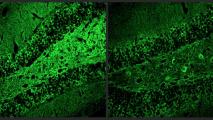
Biotech
Human history has been all but defined by death and disease, plague and pandemic. Advancements in 20th century medicine changed all of that. Now advancements in 21st century medicine promise to go even further. Could we bring about an end to disease? Reverse aging? Give hearing to the deaf and sight to the blind? The answer may be yes. And soon.
More
New “inverse vaccines” could be key to curing autoimmune disorders
“Inverse vaccines” that teach the immune system to tolerate triggering molecules could be the key to curing autoimmune disorders.
Can you speed up your metabolism? And should you?
Our metabolism is the force inside our bodies that mysteriously decides whether to convert food into energy or weight.
Here’s what’s new in the latest COVID-19 boosters
The FDA has approved new COVID-19 boosters from Moderna and Pfizer-BioNTech. Here’s what you need to know about the shots.
UT med students can now get a dual degree in AI
The University of Texas at San Antonio has launched what it says is the US’s first dual degree in medicine and AI.
Molecule reduces inflammation in Alzheimer’s models
A potential new Alzheimer’s drug represses the harmful inflammatory response of the brain’s immune cells, improving cognition in tests.
Tooth decay: Mouthwash turns your teeth blue when it’s time to go to the dentist
A mouthwash solution containing ferumoxytol and a dye could treat, prevent, and diagnose tooth decay, according to UPenn researchers.
Scientists grow “human-ish” organs in pigs for the first time
Partially human kidneys have been grown in pig embryos, marking the first example of anyone growing solid human organs in another species.
Brain implant lets cancer patients try 20 different drugs at a time
A microdevice that injects up to 20 drugs into gliomas at once could help doctors quickly identify the best treatment for cancer patients.
An enormous study links intelligence and personality in surprising ways
A database containing over 1,300 studies from across the world establishes reliable relationships between personality traits and cognitive abilities.
A magnetic therapy for depression gains precision
Approved over a decade ago, transcranial magnetic stimulation (TMS) could be effective if the treatment was tailored to individual brains.
Drug for MS may be able to treat Alzheimer’s, too
A drug approved to treat multiple sclerosis reduced neuroinflammation and improved memory in mouse models of Alzheimer’s.
20% of Americans have anxiety. NYU expert’s “consciousness theory” explains why.
Sensations of anxiety evolved to protect us. This system goes awry when you perceive immediate danger that isn’t really there.
Scientists discover a new kind of brain cell
A newly discovered brain cell that appears to be a hybrid of the two other primary types could shake up the world of neuroscience.
Can’t afford a gym membership? Add these 3 things to your workout routine
With gym memberships and fitness classes are becoming increasingly unaffordable, you can make just as much progress at home.
Popular weight-loss drugs show promise as addiction treatments
New trials will test the ability of GLP-1 agonists, a popular class of weight-loss drugs, to help people beat addictions to drugs and alcohol.
Australian ant honey inhibits tough pathogens, new research shows
Honeypot ant honey may help develop our arsenal of effective antibacterial and antifungal treatments, which are increasingly vital.
At least 5 people have been cured of HIV. Is the AIDS pandemic ending?
A handful of people have already been functionally cured of HIV — and new, universal cures are just on the horizon.
New treatment slashes obesity in mice eating fatty, sugary diet
A new obesity treatment developed at UMass triggered weight loss in mice even as they continued to eat a diet high in fat and sugar.
Transplants of lab-grown brain cells reduce Parkinson’s symptoms
Transplants of lab-grown dopamine neurons reduced the amount of time people experienced Parkinson’s symptoms in a small trial.
Artificial kidney aces test in pigs
An artificial kidney prototype just aced a pig trial, bringing it closer to human trials — and a step closer to ending the need for dialysis.
Subscribe to the newsletter































